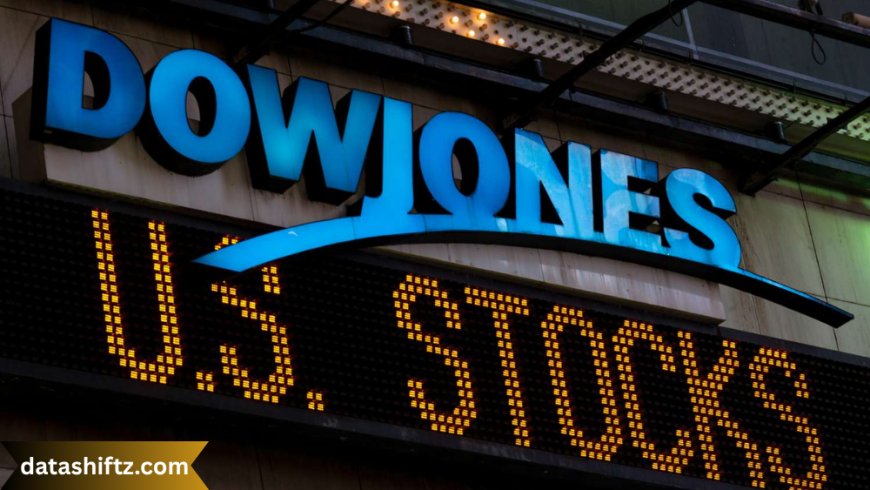Dow Jones Stock Market Futures: A Comprehensive Guide to Understanding the Markets

Introduction
In the fast-paced world of finance, Dow Jones stock market futures play a crucial role in shaping investment strategies, predicting market trends, and offering a glimpse into the trading day ahead. Often referenced by analysts and traders before the markets open, futures contracts tied to the Dow Jones Industrial Average (DJIA) are one of the most closely watched indicators in global finance.
This article provides an in-depth overview of Dow Jones futures, explaining what they are, how they work, and why they matter. We'll also explore how to read them, key factors that affect them, and how investors and traders can use them to gain an edge. With tables and lists to enhance your understanding, this blog serves as your complete guide to navigating the Dow Jones futures market.
What Are Dow Jones Stock Market Futures?
Understanding Stock Market Futures
Stock market futures are financial contracts that obligate the buyer to purchase, or the seller to sell, a stock index (like the Dow Jones) at a predetermined future date and price. Dow Jones futures specifically track the Dow Jones Industrial Average, a stock index comprising 30 major U.S. companies like Apple, Boeing, and Goldman Sachs.
Dow Jones futures are traded on exchanges such as the Chicago Mercantile Exchange (CME) and are widely used by institutional investors, hedge funds, and retail traders.
How Do Dow Jones Futures Work?
Key Concepts
-
Ticker Symbol: YM (for E-mini Dow Jones futures)
-
Trading Hours: Nearly 24/6, except weekends
-
Contract Size: $5 x the DJIA index value (for E-mini)
-
Settlement: Cash-settled, not physical delivery
-
Leverage: Futures contracts offer high leverage, which increases both profit potential and risk
Dow Jones futures help market participants hedge risk, speculate on market direction, and gauge overnight sentiment before U.S. stock markets open.
Dow Jones Futures vs. the Dow Jones Index
| Feature | Dow Jones Index | Dow Jones Futures |
|---|---|---|
| What It Represents | Average of 30 blue-chip stocks | Contract predicting future price |
| Trading Hours | 9:30 AM to 4:00 PM (ET) | 24 hours (Sun-Fri) |
| Purpose | Benchmark for performance | Hedge/speculate on future moves |
| Settlement | Cash-based stock holdings | Cash-settled futures contract |
| Access Level | Investors/ETFs | Traders/institutions |
Why Dow Jones Futures Matter
Dow Jones futures provide key insights into investor sentiment, especially during:
-
Pre-market trading
-
Geopolitical developments
-
Earnings season
-
Federal Reserve announcements
They act as a barometer for how the market will likely perform during the trading day. For instance, if Dow futures are sharply down before markets open, it's often a sign that traders expect a rough day ahead.
Factors Affecting Dow Jones Futures
Numerous factors influence the movement of Dow futures, many of which overlap with those impacting broader financial markets. These include:
List of Key Factors:
-
Economic Data Releases
-
Jobs reports, CPI, GDP figures
-
-
Federal Reserve Policy
-
Interest rate decisions, FOMC meeting minutes
-
-
Corporate Earnings
-
Results from Dow 30 companies
-
-
Geopolitical Tensions
-
Conflicts, sanctions, trade negotiations
-
-
Global Market Trends
-
Performance of Asian and European markets
-
-
Currency Fluctuations
-
Especially USD strength/weakness
-
-
Commodities Prices
-
Oil, gold, and other critical inputs
-
-
Technological or Political Shocks
-
Cyberattacks, election outcomes, regulatory changes
-
Real-Time Example: Dow Jones Futures Snapshot
| Indicator | Value | Status |
|---|---|---|
| Dow Futures (YM=F) | 39,950 | ▲ +120 points |
| S&P 500 Futures (ES=F) | 5,000 | ▲ +18.50 points |
| Nasdaq Futures (NQ=F) | 18,150 | ▲ +65.75 points |
| Previous Dow Close | 39,830 | — |
| Opening Bell Time (ET) | 9:30 AM | — |
Who Uses Dow Jones Futures?
Dow futures are versatile instruments, used by a wide variety of market participants:
List of Market Participants:
-
Institutional Investors – Hedge against large equity holdings.
-
Retail Traders – Speculate on short-term movements.
-
Fund Managers – Adjust portfolio risk exposures.
-
Algorithmic Traders – Execute high-frequency strategies.
-
Hedge Funds – Leverage directional bets on market performance.
-
Day Traders – Capitalize on intraday volatility.
Trading Strategies for Dow Jones Futures
Whether you’re new to futures or a seasoned pro, here are some commonly used strategies:
Popular Strategies:
-
Trend Following
-
Buy when the trend is upward, sell on downtrend confirmation.
-
-
Breakout Trading
-
Enter positions when price breaks above resistance or below support.
-
-
Hedging
-
Offset risk from an equity portfolio during uncertain times.
-
-
Scalping
-
Capitalize on small price movements for quick profits.
-
-
Spread Trading
-
Trade the difference between Dow futures and another index (e.g., S&P 500 futures).
-
Advantages and Risks of Trading Dow Jones Futures
Advantages:
-
Liquidity – High volume and tight spreads
-
Leverage – Greater exposure with less capital
-
Around-the-Clock Trading – Ideal for reacting to global news
-
Transparency – Traded on regulated exchanges
Risks:
-
Leverage Cuts Both Ways – Amplified losses
-
Volatility – Sudden price swings are common
-
Complexity – Not ideal for beginners
-
Margin Requirements – Need sufficient capital in your account
Dow Jones Futures: Frequently Asked Questions
1. Where can I view Dow futures in real-time?
-
Financial websites like Yahoo Finance, Bloomberg, CNBC, or trading platforms like Thinkorswim and MetaTrader.
2. Can retail investors trade Dow futures?
-
Yes, via brokers that offer futures trading (like TD Ameritrade, Interactive Brokers, etc.).
3. Do Dow futures predict the stock market?
-
Not exactly, but they provide strong indicators of market sentiment.
4. Are there ETFs that track Dow futures?
-
Not directly. However, ETFs like DIA (SPDR Dow Jones ETF) track the Dow index performance.
Conclusion
Dow Jones stock market futures are powerful financial instruments that provide insights into market expectations, enable portfolio hedging, and offer trading opportunities around the clock. Understanding how these futures work, what affects them, and how to use them strategically can give both traders and investors a significant edge.
With global events happening by the minute and markets reacting instantly, keeping an eye on Dow Jones futures is essential for anyone serious about navigating today’s financial markets.
Whether you're watching to prepare for the trading day or planning a futures trade of your own, the Dow Jones futures market offers a window into the pulse of the global economy. Stay informed, trade wisely, and use this guide to make data-driven decisions.





























